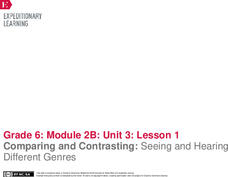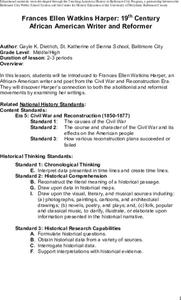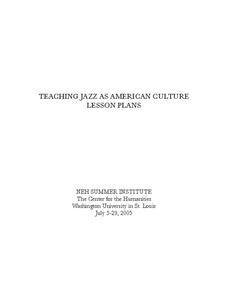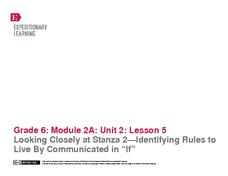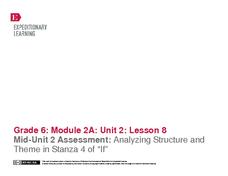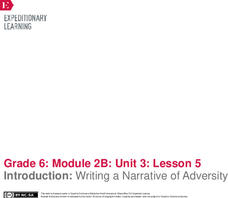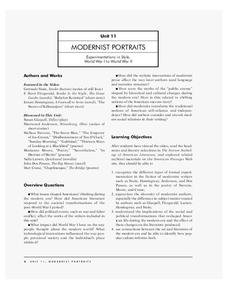Facing History and Ourselves
Speaking Up and Speaking Out
The final lesson in the Standing Up for Democracy unit offers class members a way they can stand up and speak out by crafting spoken word poetry, or Slam poetry. After analyzing several examples, individuals reflect on one positive...
National Endowment for the Humanities
“Every Day We Get More Illegal” by Juan Felipe Herrera
A study of Jan Felipe Herrera's poem "Every Day We Get More Illegal" opens the door for a discussion on immigration. To begin, class members examine the photograph "Desert Survival," record their observations of the image, and then...
Learning for Justice
Maya Angelou
Maya Angelou's poem, "Still I Rise", offers young scholars an opportunity to consider how poets use literary devices to create powerful messages. After a close reading and discussion of the poem, class members reflect on how they can...
EngageNY
Looking Closely at Stanza 1—Identifying Rules to Live By Communicated in “If”
Here is a lesson plan in which pupils connect themes and rules to live by from the story Bud, Not Buddy by Christopher Paul Curtis to those found in the poem If by Rudyard Kipling. First, scholars discuss their reading and review Bud's...
EngageNY
Introducing “If” and Noting Notices and Wonders of the First Stanza
After reading chapter 14 of the story Bud, Not Buddy by Christopher Paul Curtis, scholars take part in a read-aloud of the poem If by Rudyard Kipling and compare it to the reading of Bud, Not Buddy. Learners then go deeper into the poem...
EngageNY
Notices, Wonders, and Vocabulary of the Third Stanza of “If”
How does one's experience reading a poem's text differ from listening to its audio version? Delve into the insightful question with the poem, If by Rudyard Kipling, as pupils compare and contrast their experience using a note-taking...
EngageNY
Looking Closely at Stanza 3—Identifying Rules to Live By Communicated in “If”
Just as Bud, from the novel Bud, Not Buddy by Christopher Paul Curtis, had rules to live by, so does the poem, If by Rudyard Kipling, but how do the two relate? Pupils delve deep into the poem's third stanza, participate in a grand...
EngageNY
Comparing and Contrasting: Seeing and Hearing Different Genres
Let's compare and contrast! Scholars use a Venn diagram to compare and contrast the experience of reading a poem and listening to its audio version. Next, they complete graphic organizers, comparing two different genres: a poem and a...
EngageNY
Analyzing, Comparing, Sharing: Modern Voices
What do modern voices sound like? Scholars explore the topic, reading two concrete poems from John Grandit's Blue Lipstick and analyzing them using a graphic organizer. Next, they read a third poem and work with partners to look for...
EngageNY
Analyzing and Discussing: Modern Voices
This is the way we go to school. Scholars take a look at two poems about different ways to get to school, TyrannosaurBus Rex and Point A to Point B. Pupils work in triads to analyze the poem images and determine the theme.
National Gallery of Art
The First African American Regiment
Young historians examine a memorial sculpture of the first African American regiment in the Civil War, and then compare how the experiences of the regiment are portrayed in letters and poetry, as well as in the motion picture, Glory.
Alabama Department of Archives and History
Clotilde, The Last Slave Ship
The Clotilde was the last known ship to bring slaves from Africa to the United States - good riddance! Dive into the details of the ship, its cargo, origin, and route, and learn about the future of the Africans on board with a...
Curated OER
Poetic Elements Are Fun!
Engage your class in the elements of poetry with a series of lessons and activities. The plans cover simile, metaphor, personification, onomatopoeia, alliteration, and imagery. Learners come up their their own metaphors, identify poetic...
Academy of American Poets
The Immigrant Experience
The Buttonhook by Mary Jo Salter is the focus of a unit that explores the immigration experience to Ellis Island. First, scholars bring in an artifact that represents their heritage. A group-exercise allows them to share and discuss...
Center for History Education
Frances Ellen Watkins Harper: 19th Century African-American Writer and Reformer
Although some African American abolitionists—such as Sojourner Truth and Frederick Douglass—are well known, others, like Frances Ellen Watkins Harper, remain in the shadows of history. Harper was a poet and activist who played an...
Angel Island Immigration Station Foundation
Conditions in China: Why Might One Leave Home Forever?
Primary source texts provide scholars with the background information they need to understand why Chinese peasant farmers were driven to emigrate. After underlining keywords, phrases, and/or lines in the texts, individuals craft a...
Washington University in St. Louis
Teaching Jazz as American Culture
Jazz and the City, Jazz and the Civil Rights Movement, Jazz and Gender, Jazz and Literature, Jazz and the Arts, Jazz and Film. Here's a packet of unit plans organized around themes that reflect American culture. Each unit examines how...
West Corporation
Making Inferences – Use Your Mind to Read!
How can you tell if someone is happy? The lesson works with elementary and middle school scholars to activate their schema and pay attention to details to make inferences in their daily lives, poetry, and other literature. Cleverly...
EngageNY
Notices and Wonders of the Second Stanza of “If”
Here is an instructional activity that asks pupils to analyze poetry and sparks discussion about two different types of texts: asking how is the poem, If by Rudyard Kipling alike and different from the story, Bud, Not Buddy by...
EngageNY
Looking Closely at Stanza 2—Identifying Rules to Live By Communicated in “If”
Pupils take part in a close reading of the poem, If by Rudyard Kipling, in which they delve deep into its meaning and identify its rules to live by. As the grand discussion progresses, learners then relate the poem's rules with those...
EngageNY
Analyzing Structure and Theme in Stanza 4 of “If”
Here is a lesson that provides scholars with two opportunities to stretch their compare-and-contrast muscles. First, learners compare and contrast their experience reading the fourth stanza of If by Rudyard Kipling to listening to the...
EngageNY
Introduction: Writing a Narrative of Adversity
A little adversity is good for writing. Scholars review narrative-based monologues and concrete poems and choose which genre to use to express their own theme of adversity. Pupils also consider how to structure their narratives by...
Annenberg Foundation
Modernist Portraits
How did literature reflect people's attitudes in post-World War I America? A lesson explores the topic using a variety of activities. Individuals watch and respond to a video; read author biographies and engage in discussion; write...
Annenberg Foundation
Utopian Promise
Scholars learn all about the Puritans in the third installment of a 16-part lesson series. After watching a video, they read and discuss biographies of Puritans and Quakers from American history, write journal entries and poetry, and...
Other popular searches
- 6th Grade Poetry Unit
- 2nd Grade Poetry Unit
- 3rd Grade Poetry Unit
- 7th Grade Poetry Unit
- 5th Grade Poetry Unit
- Poetry Unit Plans
- Poetry Unit Grade Three
- Modern Poetry Unit
- Poetry Unit Rhyme
- Huge Poetry Unit
- African American Poetry Unit
- Poetry Unit Jack Prelutsky









